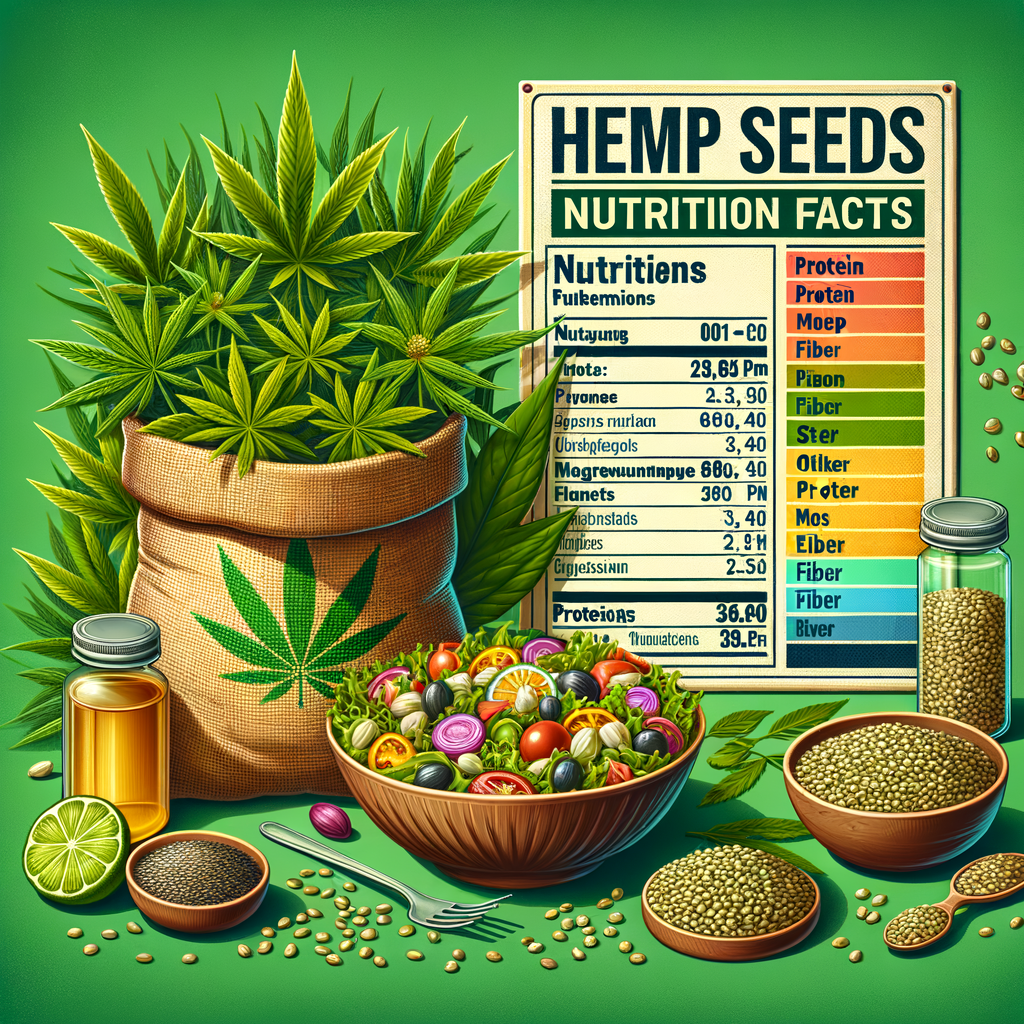
Hemp Seeds Nutrition Facts: Must-Have for Ultimate Health
- What Are Hemp Seeds?
- Nutrient Profile of Hemp Seeds
- Macronutrients
- Micronutrients
- Health Benefits of Hemp Seeds
- Heart Health
- Digestive Health
- Skin Health
- Immune System Support
- Muscle Recovery and Growth
- How to Incorporate Hemp Seeds into Your Diet
- Breakfast Options
- Snacks
- Cooking and Baking
- Hemp Seed Products
- Hemp Seed Oil
- Protein Powder
- Hemp Seed Hearts
- Potential Considerations
- Allergies
- Caloric Density
- Frequently Asked Questions (FAQs)
- 1. Can I eat hemp seeds every day?
- 2. Are hemp seeds safe for children?
- 3. How should I store hemp seeds?
- 4. What is the best way to eat hemp seeds?
- 5. Do hemp seeds cause weight gain?
- 6. Can I use hemp seeds for baking?
- 7. Are there any side effects of consuming hemp seeds?
- 8. Is hemp seed oil the same as CBD oil?
- 9. How do I know if I’m allergic to hemp seeds?
- 10. Can I feed hemp seeds to pets?
- References
Hemp Seeds Nutrition Facts: Must-Have for Ultimate Health
What Are Hemp Seeds?
Hemp seeds come from the Cannabis sativa plant. Unlike their cousin marijuana, hemp seeds contain minimal THC, which means they don’t get you high. Instead, they pack a punch when it comes to nutrition. People often describe hemp seeds as tiny powerhouses due to their rich nutrient profile.
These seeds have been cultivated for thousands of years. Many cultures have relied on them for food, medicine, and even textile production. Now, they are making a comeback in modern health circles. You can sprinkle them on salads, blend them in smoothies, or use them as a protein source in various recipes.
Nutrient Profile of Hemp Seeds
Macronutrients
Hemp seeds are notable for their exceptional macronutrient composition. They primarily consist of three main components: proteins, fats, and carbohydrates. Let’s break these down further.
1. Proteins: Hemp seeds are a fantastic protein source. They contain about 25% protein, with all nine essential amino acids. This is especially beneficial for vegetarians and vegans who might struggle to get enough complete protein from other plant sources.
2. Fats: Approximately 30% of hemp seeds consist of healthy fats. They are rich in omega-3 and omega-6 fatty acids, which are essential for heart health and overall well-being. The ratio of omega-6 to omega-3 is around 3:1, making them a perfect addition to any diet.
3. Carbohydrates: Hemp seeds are relatively low in carbohydrates, with about 5% of their content coming from carbs. This low carb profile makes them suitable for various dieting plans, including low-carb or ketogenic diets.
| Nutrient | Per 100g |
|——————|—————|
| Protein | 25g |
| Fat | 30g |
| Carbohydrates | 5g |
| Fiber | 5g |
Micronutrients
Besides macronutrients, hemp seeds boast an impressive array of vitamins and minerals. They are particularly rich in vitamin E, magnesium, potassium, and calcium. These micronutrients contribute significantly to overall health.
– Vitamin E: This antioxidant helps protect the body from oxidative stress. It also promotes skin health and boosts the immune system.
– Magnesium: Essential for numerous biochemical processes in the body, magnesium contributes to muscle function, energy production, and even sleep regulation.
– Calcium: Often associated with dairy products, hemp seeds provide a plant-based source of calcium, which is vital for bone health.
Health Benefits of Hemp Seeds
Heart Health
Heart disease remains a leading cause of death globally. Incorporating hemp seeds into your diet can support cardiovascular health. Their rich omega-3 and omega-6 fatty acid content helps reduce cholesterol levels. This can lead to a decrease in heart disease risk.
These seeds also contain arginine, an amino acid that produces nitric oxide. Nitric oxide relaxes blood vessels and promotes better blood flow. These benefits collectively contribute to a healthier heart.
Digestive Health
Fiber plays a crucial role in digestive health. Hemp seeds provide a good source of both soluble and insoluble fiber. This makes them great for promoting regular bowel movements. Fiber can also help maintain a healthy gut lining and balance gut microbiota.
Moreover, hemp seeds can promote satiety, helping you feel full longer. This can be beneficial if you’re trying to manage your weight.
Skin Health
Improving skin health is another compelling reason to include hemp seeds in your diet. Their omega-3 fatty acids can help reduce inflammation and acne. Many skincare products also incorporate hemp oil due to its nourishing and hydrating properties.
Additionally, the gamma-linolenic acid (GLA) present in hemp seeds can improve skin conditions such as eczema. Regular consumption might lead to a more vibrant and youthful complexion.
Immune System Support
A robust immune system is vital for overall health. Hemp seeds can enhance immunity due to their rich nutrient composition. The essential fatty acids contribute to cell membrane health, which is crucial for immune response. Additionally, the antioxidants present in hemp seeds can protect cells from free radical damage.
Muscle Recovery and Growth
For fitness enthusiasts, hemp seeds serve as an excellent post-workout snack. The protein content aids muscle recovery and growth. Their amino acid profile supports muscle repair, making them a suitable option for athletes and those engaged in regular physical activity.
How to Incorporate Hemp Seeds into Your Diet
Adding hemp seeds to your diet is both easy and versatile. You can use them in numerous ways, making it simple to enjoy their health benefits.
Breakfast Options
You can start your day by sprinkling hemp seeds on yogurt or oatmeal. This not only boosts the nutritional value of your breakfast but also adds texture. Additionally, they blend well in smoothies, providing a creamy consistency.
Snacks
Use hemp seeds as a topping for popcorn or salad. You can also mix them into energy balls or protein bars for a nutritious snack on the go. They’re crunchy and flavorful, making them a delicious addition.
Cooking and Baking
Hemp seeds can enhance various recipes. Incorporate them into muffins, pancakes, or bread for extra nutrition. Their nutty flavor works wonders in both sweet and savory dishes.
Hemp Seed Products
In the market, you’ll find various hemp seed products, each offering unique benefits.
Hemp Seed Oil
Hemp seed oil is extracted from the seeds themselves. This oil is rich in omega fatty acids, making it great for salad dressings and dips. However, it has a low smoke point, so avoid using it for high-temperature cooking.
Protein Powder
Hemp protein powder is another popular product. It offers a convenient way to boost your protein intake, especially for plant-based eaters. Mix it into smoothies or combine it with oats for overnight breakfast meals.
Hemp Seed Hearts
These are the hulled seeds, which have a softer texture and nutty flavor. They’re great for those looking for an easier way to incorporate hemp seeds without the hard shell.
Potential Considerations
Though hemp seeds offer impressive health benefits, they may not be ideal for everyone. Here are some considerations to keep in mind.
Allergies
Some individuals may be allergic to hemp seeds. If you have a history of food allergies, consult your healthcare provider before trying them.
Caloric Density
While healthy, hemp seeds are still calorie-dense. Practicing moderation is key, especially if you’re monitoring your caloric intake.
Frequently Asked Questions (FAQs)
1. Can I eat hemp seeds every day?
Yes, consuming hemp seeds daily can provide numerous health benefits, given their rich nutrient profile.
2. Are hemp seeds safe for children?
Hemp seeds are generally safe for children. However, consult your pediatrician to ensure they are appropriate for your child’s diet.
3. How should I store hemp seeds?
Store hemp seeds in a cool, dark place. An airtight container in the refrigerator will maintain their freshness for longer periods.
4. What is the best way to eat hemp seeds?
You can eat them raw, add them to smoothies, yogurt, or salads, or incorporate them into baked goods for improved taste and nutrition.
5. Do hemp seeds cause weight gain?
When consumed in moderation, hemp seeds can fit into a healthy diet. They can support weight management due to their protein and fiber content.
6. Can I use hemp seeds for baking?
Absolutely! Hemp seeds can enhance the nutritional value of muffins, bread, and other baked goods.
7. Are there any side effects of consuming hemp seeds?
Most people can enjoy hemp seeds without side effects. However, individuals with allergies should exercise caution.
8. Is hemp seed oil the same as CBD oil?
No, hemp seed oil comes from the seeds and does not contain CBD. CBD oil is extracted from the flowers and leaves of the cannabis plant.
9. How do I know if I’m allergic to hemp seeds?
Symptoms of an allergy may include rash, itching, or gastrointestinal issues. Consult with a healthcare provider for proper testing and advice if you suspect an allergy.
10. Can I feed hemp seeds to pets?
Yes, many pet owners incorporate hemp seeds into their pets’ diets. However, ensure you do so in moderation, and consult your veterinarian first.
Incorporating hemp seeds into your diet offers numerous benefits. Their unique nutrient profile supports overall health, making them a wise addition to various meals. Embrace this “superfood” and let its nutritional punch elevate your well-being.
References
1. Healthline on Hemp Seeds
2. WebMD on Nutritional Benefits
3. NCBI on Hemp Seed Nutrition
4. Medical News Today on Benefits of Hemp Seed
5. Verywell Fit on Hemp Seed Health Benefits
With your newfound knowledge about hemp seeds and their potent nutritional benefits, why not start including them in your daily meals today? Your body will thank you!

